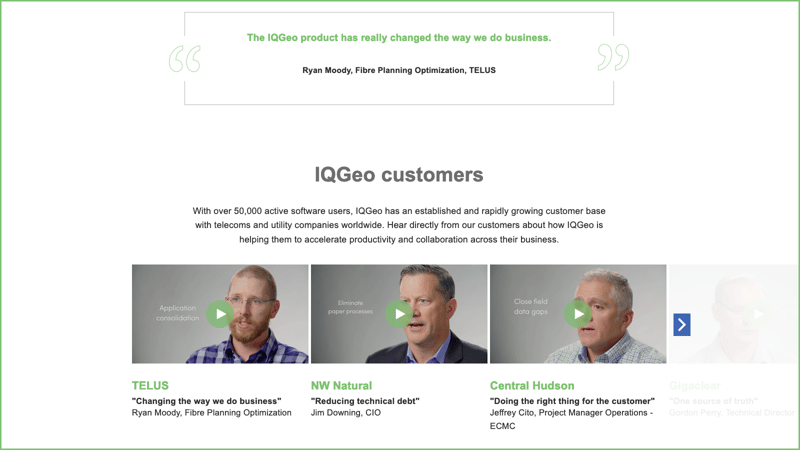Written panel series #1
In this series we will be asking our panel of experts across the geospatial, telecom and utility industries questions about the key issues impacting our world today. This month, we have asked participants about the ongoing “innovation” priority for network operators.
“What should be the single biggest innovation priority in 2022 for utility and telecom network operators?”
 “Speaking from a North American, and fibre to the home perspective, first and foremost, network operators should be laser focused in ensuring every member in the communities that they serve have fibre. We are at the beginning of the largest fibre investment cycle in history that should enable our industry to close the digital equity gap once and for all.
“Speaking from a North American, and fibre to the home perspective, first and foremost, network operators should be laser focused in ensuring every member in the communities that they serve have fibre. We are at the beginning of the largest fibre investment cycle in history that should enable our industry to close the digital equity gap once and for all.
Assuming that all the homes in your network are connected with fibre, the next order of business is the In-Home Experience. The FBA has recently formed an In-Home Experience working group to address the factors critical to addressing this strategic issue.
FBA studies show that consumers with 900+Mbps service are on average getting 121Mbps from their in-home network. Our studies show that by simply upgrading the home from a single Wi-Fi device to a Wi-Fi mesh network improves the Net Promoter Score (NPS) by 2.5x. Operators that focus on innovation to provide a better “in-home experience” will not only significantly improve customer satisfaction and reduced churn rates but can also create new revenue streams with in-home managed service offering.”
Hear more from Gary Bolton on Network IQ industry chat. Gary explores strategies that successful network operators can deploy to help them win the fiber rollout race.
 “The foundation of operational efficiency, a core theme of 2022 for forward thinking fiber network operations, is data you can trust. The important data for a fiber operator is an accurate and flexible digital representation of their fiber network assets.
“The foundation of operational efficiency, a core theme of 2022 for forward thinking fiber network operations, is data you can trust. The important data for a fiber operator is an accurate and flexible digital representation of their fiber network assets.
More and more fiber operators are maturing their technology infrastructure by moving from a set of disconnected applications, think Google Earth and spreadsheets, to a purpose-built System of Record to store their fiber data. With an optimized solution, fiber operators have a clear visibility of their network's capacity, the ability to rapidly respond to outages and have a trusted network view to integrate with other areas of their business. As more business systems are integrated, fiber operators can run their planning and design workflows in a quicker, more data-driven way, which translates directly to cost-savings and improved customer service.”
Read more on Managing your network through a single pane of glass – Going beyond GIS.
 “Building long-term resilience in the energy and telecoms infrastructure is the single most important objective to lessen the impact of climate-related disruption to shareholders and the wider society. And building resilience requires utility companies to look at the problem from a system perspective, where actions taken to resolve a problem in one sector may have unintended consequences in another. This requires utilities and telecoms network operators to open their siloed data and build the necessary trust required for better collaborative working.
“Building long-term resilience in the energy and telecoms infrastructure is the single most important objective to lessen the impact of climate-related disruption to shareholders and the wider society. And building resilience requires utility companies to look at the problem from a system perspective, where actions taken to resolve a problem in one sector may have unintended consequences in another. This requires utilities and telecoms network operators to open their siloed data and build the necessary trust required for better collaborative working.
Project CReDo, the UK National Digital Twin programme’s Climate Resilience Demonstrator, is an example of how utility companies should innovate moving forward. CReDo brings together infrastructure data across several utilities and telecoms asset owners with other environmental data such as tree cover, the road network, temperature, precipitation, and topography into one digital twin of the infrastructure system. This helps them build future flooding scenarios within a simulation environment. In this way, asset owners and regulators can better understand the interdependencies of extreme weather events on energy infrastructure and make decisions to achieve the intended goal, be it to minimise disruptions to the wider society, loss of money to the shareholders, and increase resilience in the system.”
Read more from Luca Budello on Realising the potential of geospatial data: the value of collaboration and trust.
Learn more about Innovate UK KTN.
 “To innovate effectively within an organisation, integration is key. Constant innovation is built on collaboration, and this requires an environment where all stakeholders across the lifecycle have the same view and a single source of network truth. If this isn’t prioritised, network operators are faced with information gaps and overlaps in process that cause inefficiencies and confusion that impair business performance.
“To innovate effectively within an organisation, integration is key. Constant innovation is built on collaboration, and this requires an environment where all stakeholders across the lifecycle have the same view and a single source of network truth. If this isn’t prioritised, network operators are faced with information gaps and overlaps in process that cause inefficiencies and confusion that impair business performance.
Having a common dashboard that integrates all data sources doesn’t just improve operational decision-making and reactive response, but it provides a powerful tool to support innovation and ultimately, long term growth, for companies across both the utilities and telecoms sectors. Those who don’t prioritise a culture of “constant innovation” will be at a disadvantage.”
Watch the case study video from Gordon Perry, Technical Director at Gigaclear on creating a single source of network truth for efficient network rollout.
 “Considering the utilities sector in Europe specifically, one of the challenges our network operators face is the often-competing demands of customers and shareholders. Top innovation priorities should aim to deliver value to both these important stakeholders.
“Considering the utilities sector in Europe specifically, one of the challenges our network operators face is the often-competing demands of customers and shareholders. Top innovation priorities should aim to deliver value to both these important stakeholders.
One of these priorities should be understanding cross-sectoral dependency, for example between energy and water. Both need to focus on gaining a better understanding of the networks’ co-dependence and reliance on the same assets such as bridges and drainage channels, and then based on that knowledge find ways that can combine planning approaches across the two utilities.
Another priority should be enabling positive change in consumer behaviour when it comes to energy and water usage by raising awareness and providing simple, cost-effective ways that lead to reduction in use and increased resilience to weather extremes.”
Read more from Miranda Sharp on the importance of digital twins for telecommunications and utilities.
 “Enabling field crew with modern mobility solutions should be moved further up on agenda, especially when you consider its importance in supporting disaster response as well as broader innovation efforts.
“Enabling field crew with modern mobility solutions should be moved further up on agenda, especially when you consider its importance in supporting disaster response as well as broader innovation efforts.
With natural disasters becoming more common, field teams need the ability to document as well as identify data in real time, not just to improve operational efficiency with better quality data, but improve network reliability and customer safety. When Typhoon Faxai hit Japan in 2019, Tokyo Electric Power Company (TEPCO) was able to overlay live geospatial information on blackout locations onto Google Maps data to help engineers quickly identify the sites of damage or hazards. This ‘disaster response dashboard’ was only made possible because of a decentralized approach to capturing and sharing data.
With disasters unfortunately becoming a regular feature globally, network operators must develop an integrated technology vision, and the only real strategy is rooted in decentralization.”
Watch the case study video from Hideaki Miyamoto, Manager – System Management Group at TEPCO on comprehensive geospatial view of damage information.
IQGeo’s Network IQ series shares insights from experts on important telecom and utility industry conversations. You can enjoy the series through short written options and video interviews.
While legacy network management solutions still focuses on their GIS, IQGeo is different. Our Network Manager and application software focuses on your network, and how you can more flexibly and efficiently plan, design, construct and operate your increasingly complex networks. Whether you're building a new fiber and 5G network, modernizing your electricity grid for a renewable future, or delivering safe dependable gas services, IQGeo accelerates time to revenue from a single platform. Find out why our customers choose IQGeo.
Together with IQGeo, telecom and utility network operators build better networks to transform their business. The IQGeo software is setting new standards for productivity and collaboration that increase revenue, decrease operating costs, improve customer satisfaction, and enhance safety.

Visit the customer stories page to see how IQGeo is helping them to reimagine the role of geospatial software.

Network IQ industry chat with Gary Bolton from Fiber Broadband Association.
Watch interviewThe industry's most flexible and comprehensive geospatial solution to accelerate network planning, design and time to revenue from a single platform.
See it in action!Copyright © 2025 , IQGeo Group. IQGeo is a registered ® trademark